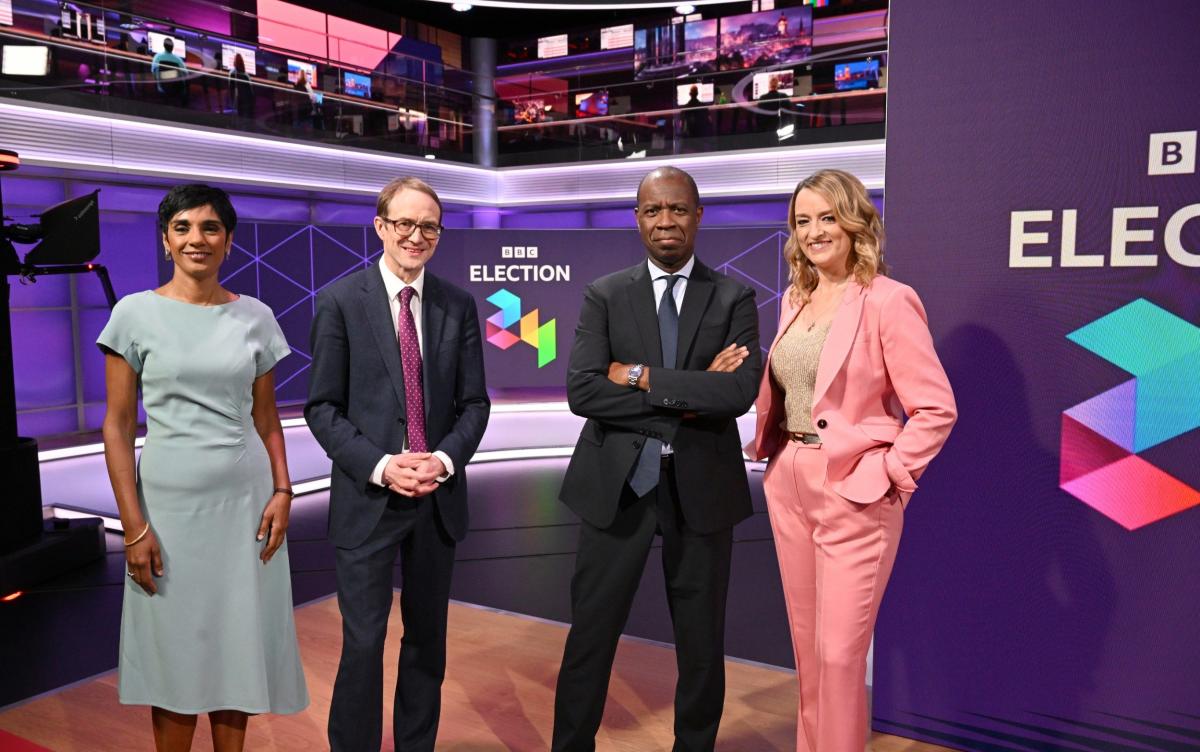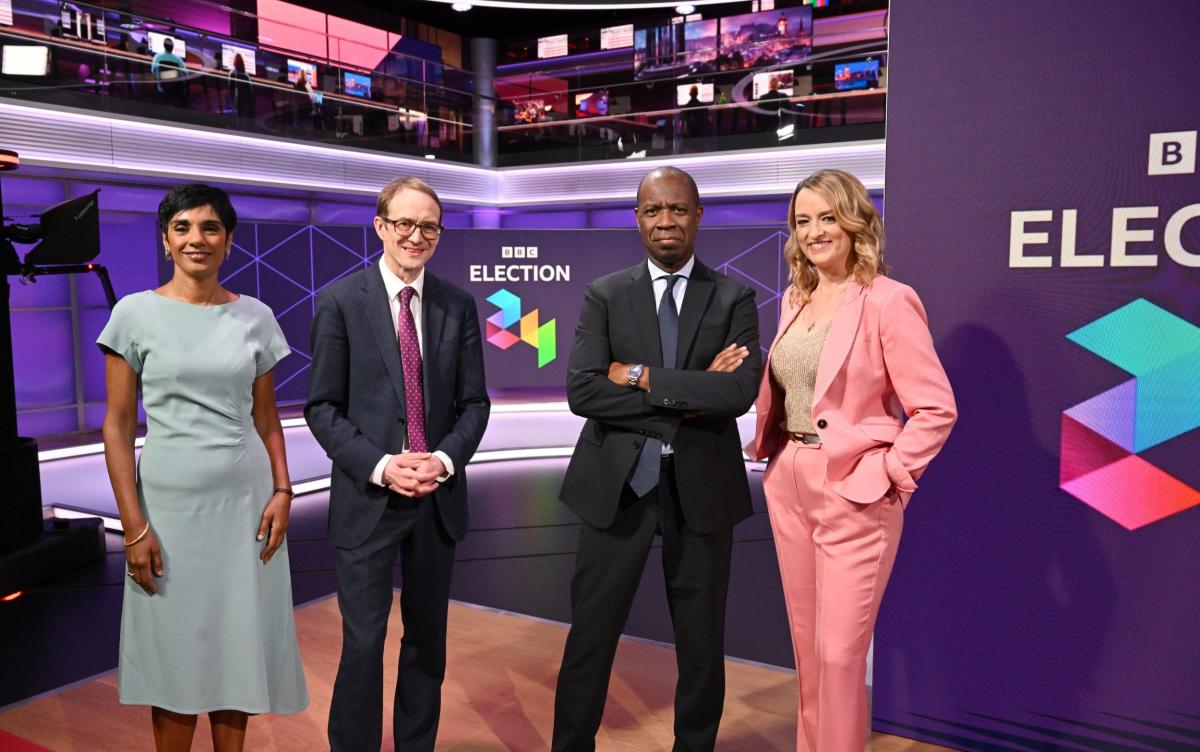
There is arguably one job involved in broadcasting the overnight results of the general election: ideally, you should broadcast the overnight results of the general election. Not necessarily all of them – 650 constituencies, many of them declaring simultaneously, is a challenge – but most. At the very least, show the key ones.
That obvious instruction explains why there has been a clamorous, and not exactly unreasonable, grumble over the past few days about how the BBC went about things last Thursday and Friday. Save for a few news updates, Election 2024 was live on BBC One for 20 hours, yet somehow, to the consternation of viewers, managed to miss various key moments. In the words of Chris Morris’s apoplectic anchor on The Day Today, they lost the news. Quite often.
“I will forever keep some hatred in my heart for the BBC’s all-nighter election coverage, which was simply very bad, and somehow managed to fundamentally misunderstand what anyone staying up all night to watch an election wants from a TV channel,” the political journalist Marie Le Conte wrote on Twitter on Sunday.
I will forever keep some hatred in my heart for the BBC’s all nighter election coverage, which was simply very bad, and somehow managed to fundamentally misunderstand what anyone staying up all night to watch an election wants from a TV channel https://t.co/0KmttaILln
— Marie Le Conte (@youngvulgarian) July 7, 2024
It was a sentiment shared by scores of others. “I think there was a fundamental misunderstanding about what people who watch an election night into the small hours are after. Sadly, those in authority at the BBC today think their own, and visiting, talking heads trump everything else,” one critic wrote on social media, where many vented their frustrations over the coverage.
Simplifying things further, another offered a sporting analogy. “It was Politics Live for eight hours when it should have been a political Soccer Saturday.” For those unfamiliar with the Sky Sports institution, which Jeff Stelling marshalled for 29 years until last season, its modus operandi is minimal chat, maximal results.
On paper – to continue the football metaphor – the BBC’s lineup was impressive: its lead news presenter, Clive Myrie, hosted alongside Laura Kuenssberg; political editor Chris Mason was on one side of them, offering analysis, while the other seat was spare for occasional guests. Nearby, Reeta Chakrabarti diced up the numbers, ably supported by election doyen Prof Sir John Curtice, while Jeremy Vine, the Andy Serkis of psephology, crept around in front of a green screen. Meanwhile, high-profile presenters and correspondents were all over the country, including Victoria Derbyshire stationed like a well-groomed badger in the hedge outside Rishi Sunak’s constituency home.
After a steady enough start, enlivened by Myrie becoming entangled in a series of questions about counting chickens and Steve Baker being told, live on air, that his chances of re-election were 1 per cent, a problem soon cropped up. At 12.15am, Swindon South’s result was declared. This was the first marginal of the night and, as predicted by the exit poll two hours earlier, saw the first senior Tory, the former justice secretary Sir Robert Buckland, beaten after a historic swing to Labour.
Yet what were the BBC doing as the results were being read? Chatting to Wales correspondent Hywel Griffith, who was giving us the view of things across the Severn. “Hywel, I’m gonna have to cut into you, mate, sorry about that – we’ve got a declaration coming up,” Myrie eventually said. But it wasn’t a declaration, it was the Labour candidate, Heidi Alexander, giving her victory speech. One viewer said she “let out a gasp” at that transition.
An early error, perhaps, but curious editorial choices kept cropping up. The drama of this particular election night was not just its overall result, but as much the miniature storylines within: the surges of the small parties, the “Portillo moments”, the obscure figures who point to much larger tectonic shifts. If anything it meant more declarations would need to be shown, not fewer.
A couple of hours later, the co-leader of the Green Party, Carla Denyer, won Bristol Central from the popular Labour MP Thangam Debbonaire, previously the shadow culture secretary. The BBC didn’t show it, instead splitting the screen between Reform UK chairman Richard Tice in Boston and a crowd of people gathering in a hall in North Yorkshire, where Sunak had not yet arrived. Denyer and Debbonaire’s tributes to one another in their speeches in Bristol have since gone viral, suggesting they might have been television-worthy.
It was not as if the BBC were short on resources. The corporation had a camera – occasionally just a mobile phone – live-streaming every single count, and published a video explaining the impressive simplicity of it. Choosing which counts to cut to is a matter of editorial judgment, both on the night and in pre-planning.
“It doesn’t even matter when the election is. As soon as it’s announced that the count for a particular seat will be at a certain location, you try to see if it’s a known place, whether we’ve broadcast from there before and can our colleagues who work or live nearby go and look at it for us? If not and it’s a big one, we have to go and recce. You take decisions like that throughout the year,” the BBC’s head of media operations, Morwen Williams, told TVB Europe on the eve of the election.
Ian Rumsey, who was in charge of Channel 4’s coverage, admitted in an interview with GQ last week that nerves about clashes are all part of it. “I don’t know whether… call it stress, call it adrenalin… but it’s once every five years, and it’s the biggest buzz you can get. You’ve got to be able to embrace that, embrace the madness and feed off it. And the stress is also the fun of it, because you’ve got to make choices. If Sunak’s seat is declaring the same time as Farage, which do you choose? Who do you go live to? Nothing comes close to that buzz, really.”
According to Williams, who was speaking before the election, the BBC sensibly builds a priority list. “There are brilliant people who look at the 650 seats and rank the really key ones [to cover]. We absolutely have to be at the leaders’ constituencies and there are certain other ones, like Sunderland, which was always the first to declare [rival northeast city Newcastle took over this position in both 2017 and 2019]. That gives you something to talk about while you’re waiting for all the other results to come in.”
All leaders except the Greens, it seems. At around 5.30am, when Denyer’s fellow co-leader of the Greens, Adrian Ramsay, won Waveney Valley in Suffolk from the Conservatives (a staggering achievement, given the vast ideological differences between those parties), it was again not shown. Understandably, the Green Party have submitted a complaint via councillor Nate Higgins.
“During the coverage of the General Election, the BBC broadcast live the declarations of the leaders of the Labour, Conservative, Liberal Democrats and Reform UK parties, and their speeches,” he wrote. “Additionally, the win in Bristol Central was simply announced as ‘The Green Party have won Bristol Central. Now let’s go to Iain Duncan Smith’.”
Invigorating as hearing from Iain Duncan Smith may be for some, Higgins has a point – and his complaint’s popularity on social media suggests others agree. Critics like to accuse the BBC of being biased in any and every direction, but the lack of focus on the live results in favour of analysing trends suggested by the exit poll or earlier data (Reform winning 13 seats, potential trouble for Sunak, a 1997 moment, and who could be the next Tory leader?), rather than the plots that seemed to be emerging (historic Liberal Democrat gains, a Green insurgency, Reform’s second-place finishes, the Muslim Vote) was odd.
When it came to Johnny Mercer, the Minister of State for Veterans’ Affairs, no channel seemed to broadcast his loss in Plymouth Moor View to Labour’s Fred Thomas. After a bad-tempered campaign, Mercer didn’t even make a concession speech. At the time the BBC were still showing Penny Mordaunt, then interviewed Lord Mandelson – again.
Myrie and Kuenssberg, fluent and informed though they are, rarely had the interviews to justify diverting attention from the counts. At one point Baker was back on the line. He had indeed lost. “I’m sad for our country because Labour are going to be a disaster,” he said. “I wanted to win this, but for me personally, thank God I’m free. It’s over, and I’m glad.”
Myrie replied: “Well that is a depressing way to end an interview, Steve, thank you for that.” For some, his tone was a little sarcastic. For others, it was a welcome and all-too-rare drop of personality.
If this all sounds like a chorus of whines from political anoraks denied the chance to watch minute-by-minute results come in, at the expense of explanation or context, it probably is. But in the middle of the night, those were the only people tuning in. And in any case, it’s a baffling use of resources when, as the BBC admits, it had the technology in place to cover so much more of the action. “It’s like taking the goals out of football coverage,” one viewer remarked, with as much puzzlement as anger.
As it was, the BBC, which has televised every election night since 1950, still topped the audience figures, with 4.2 million viewers tuning in between 10pm and 11pm on Thursday to see the exit poll – but at the last general election, where its coverage was led by Huw Edwards, the figure had been 6.1 million.
On the other side, Channel 4 doubled its ratings, after throwing resources at a chaotic programme that featured more than a dozen panellists, among them Nadine Dorries, Carol Vorderman and Alastair Campbell, to create a political house party from hell, at which somehow everybody has a podcast. Yet 4’s coverage, which it called “a noisy, disruptive and insightful alternative” was successful and praised for its liveliness.
Meanwhile, Sky News was often ahead of the BBC, especially when it came to adjusting the numbers as the picture changed, and managed to punch far above its weight when it came to the amount of declarations shown. ITV took a straight-laced approach, treating its audience to hours of George Osborne.
As for GB News, “The People’s Channel” involved the great British public in its coverage, in the form of a live studio audience having dinner – drinks included, of course. They produced the type of soundbites you’d expect after that kind of hospitality. “Do you trust Keir Starmer?” presenter Patrick Christys asked a woman with a mouth full of chicken burger. “No, he’s a pervert,” came the response.
The GB News coverage of the election is unmatched. 😅
❓️Do you trust Keir Starmer?
❗️NO! He’s a pervert! 🤣🤣🤣 pic.twitter.com/2bYICVWgys
— Major Gowen (@MajorGowen_) July 4, 2024
Of course, all the broadcasters were essentially showing the same thing. And faced with the challenge of differentiating themselves from one another, made their own choices, and took their own risks. Lessons will have been learnt. It may seem an old-fashioned view, but here’s the headline: during an election results programme, broadcasting the general election results seems to be what the people want.
EMEA Tribune is not involved in this news article, it is taken from our partners and or from the News Agencies. Copyright and Credit go to the News Agencies, email news@emeatribune.com Follow our WhatsApp verified Channel





